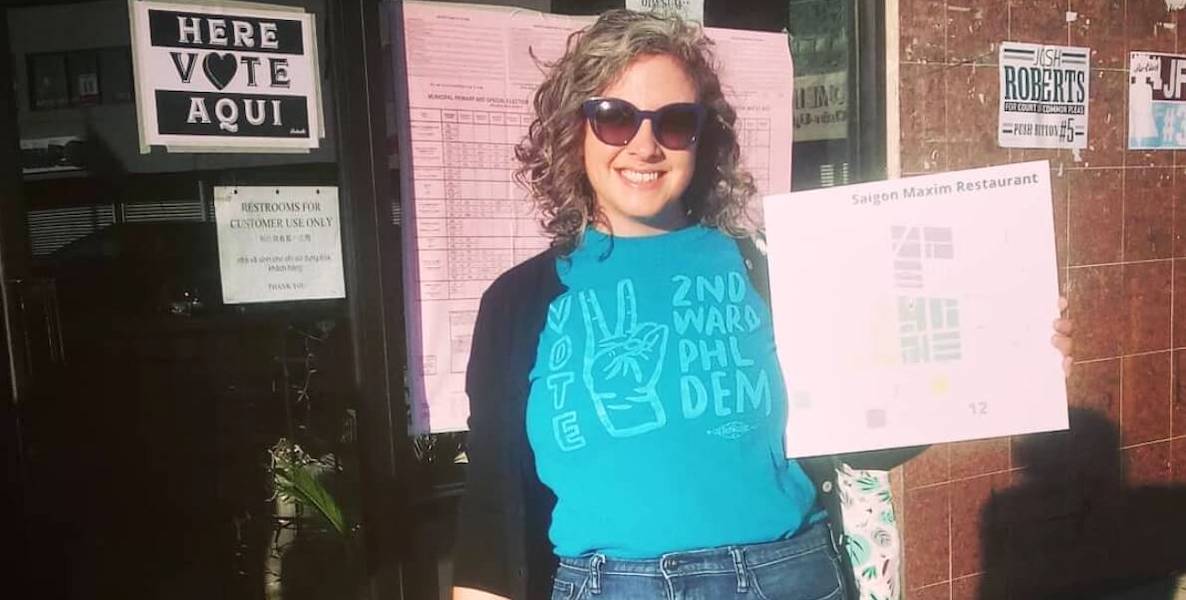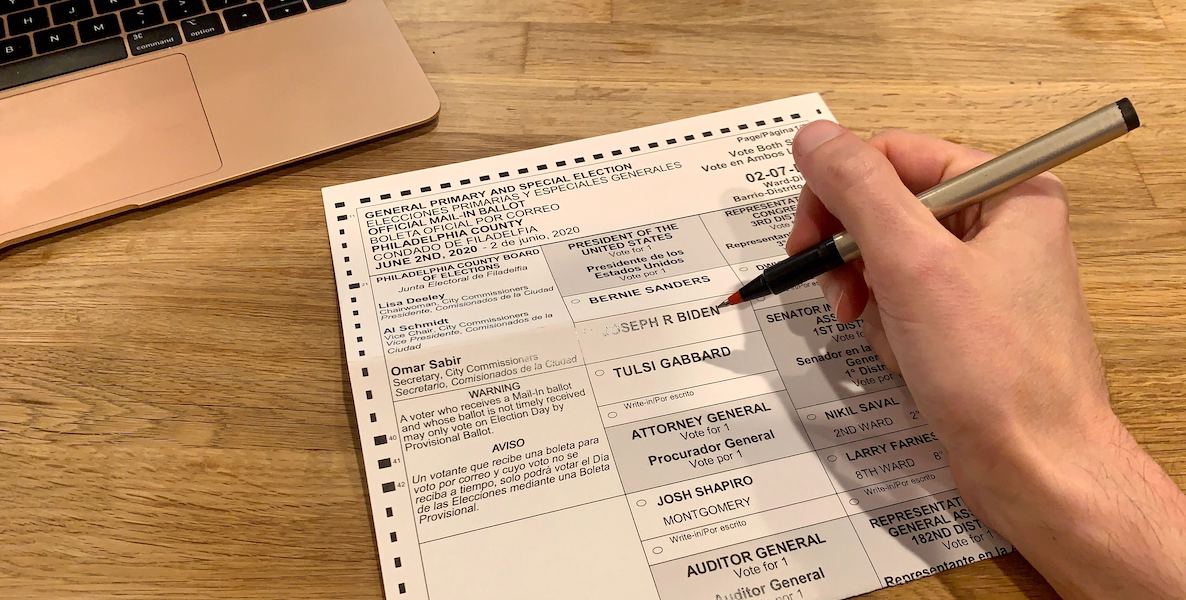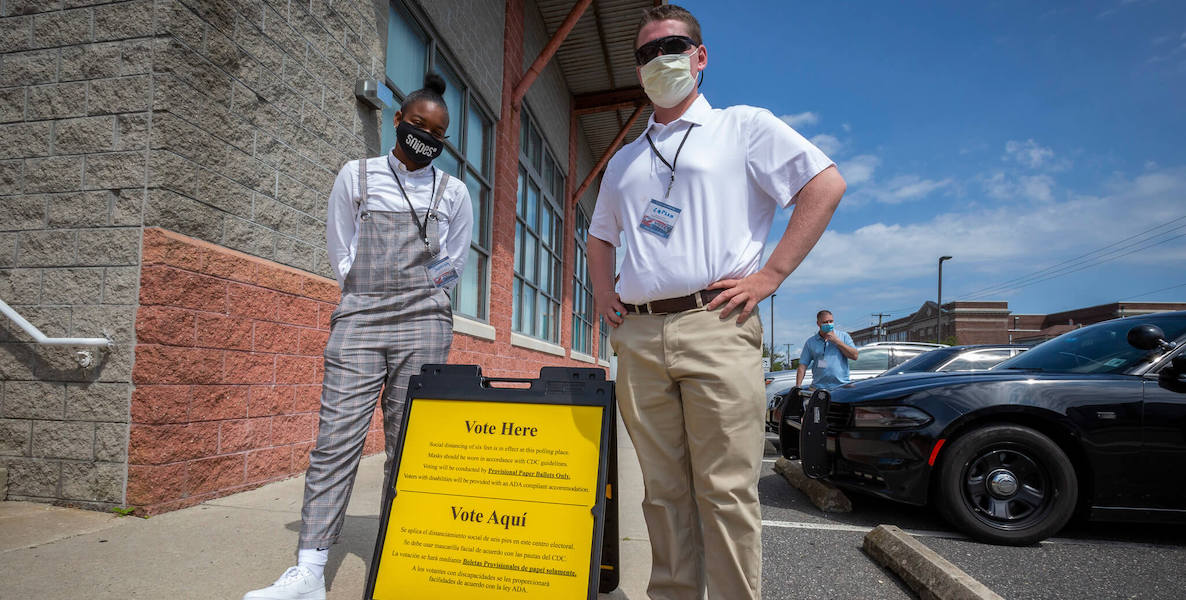Amanda Feifer’s road to becoming Judge of Elections at her South Philadelphia polling station is a classic Philly election tale: Frustrated by years of incompetence in her voting division, Feifer in 2013 investigated what it would take to run.
Then she chickened out and never turned in the petition with the signatures needed for her name to appear on the ballot. But on Election Day, Feifer wrote herself in to be an elections Inspector anyway. And—surprise, surprise—she won! With just her one vote.
Since then, Feifer has spent every election in her polling station, working to ensure her neighbors have an easy, enjoyable and fulfilling experience casting their ballots. It is sometimes, she admits, grueling and boring. But mostly, it’s a total delight.
“It might look like drudgery from the outside,” Feifer says. “But the truth is, it feels a little like you’re a superhero. You know you’re enabling your neighbors to vote in a way that’s beneficial for the whole community. I love it.”
An Alarming Shortage
This year, Feifer is not only overseeing the elections in her one polling division; she is also, as an elected Democratic Committeemember in the 2nd Ward, helping to staff all the 29 different polling stations in the ward. That means ensuring there are around 150 people willing to spend about 15 hours helping voters cast their ballots on November 3.
![]() Mostly, Feifer is having good luck in her community. But that’s not the case everywhere in the city—or, indeed, the country, where nearly 60 percent of poll workers are over 60 years old, and 30 percent are over 70, making them especially vulnerable to Covid-19.
Mostly, Feifer is having good luck in her community. But that’s not the case everywhere in the city—or, indeed, the country, where nearly 60 percent of poll workers are over 60 years old, and 30 percent are over 70, making them especially vulnerable to Covid-19.
In wide swaths of Philly, according to the Committee of Seventy’s Chief Advancement Officer Lauren Cristella, there is an alarming shortage of workers needed to open the polls; those areas also often coincide with the parts of town where more people tend to vote in person, rather than by mail.
To run the elections at full capacity—something everyone agrees is needed this particular year—the city needs about 8,500 citizen poll workers spread around the 800 planned polling stations. Right now, we have about half that number—and even those people are not always guaranteed to show up.
“In the primary, we saw unprecedented callouts,” says City Commissioner Omar Sabir. “Some people who have worked 20, 30, 40 years consecutively, and always showed up, called out. This time, some people have resigned, and some have already given notice that they’re not participating in this election because of Covid-19 fears.”
That’s why the City and those interested in seeing the election run smoothly are in a full-on push to recruit poll workers who feel comfortable operating and overseeing the election on November 3. As part of that effort, in August, the Commissioners voted to double the pay for poll workers, to $200 plus another $50 for training.
Officially, interested individuals can apply to work the polls at philadelphiavotes.com. But for a quicker response time and more robust training, the Committee of Seventy has partnered with the Voter Project, a Pennsylvania organization working with the national Power the Polls, to recruit interested Philadelphians and hook them up with the City.
They are also offering three online trainings that go beyond the basic legal information provided by the Commissioners office, as well as printed materials with answers to common questions, so that the workers who do show up on Election Day will be prepared to manage the unusual set of circumstances they’ll face in November.
Several community groups, including Fairmount Votes, have joined the effort. REC Philly is hosting a virtual concert to drum up interest among younger adults tonight, with Julian King and Andrea Vallé. Youth groups like Vote That Jawn and When We All Vote have formed Poll Heroes to help to recruit 18- and even 17-year-olds, who are eligible to be machine operators even before they can vote. Sabir says so far, 600 teenagers are signed up to work in November.
Anyone registered to vote in Philadelphia, or anyone who is 17 and a citizen, is eligible to be a poll worker. Cristella says they particularly need people who are bilingual, and who are willing to travel to a possibly distant part of the city to work at understaffed polling stations. (She noted that once again, Lyft is offering free rides to the polls, for workers and voters.)
We Have to Work Together to Keep Chaos at Bay
It is maybe obvious to point out that the election will be an impending disaster unless we all work together to ensure it is not.
![]() In June, during the delayed primary, the city had only 188 polling stations, and there was much chaos, which delayed even further the delayed count. Urban demographer Jonathan Tannen, who breaks down election results on his blog Sixty-Six Wards, estimates the city lost 19,000 votes due to poll closures. That could be enough to decide the election in Pennsylvania—or even the country.
In June, during the delayed primary, the city had only 188 polling stations, and there was much chaos, which delayed even further the delayed count. Urban demographer Jonathan Tannen, who breaks down election results on his blog Sixty-Six Wards, estimates the city lost 19,000 votes due to poll closures. That could be enough to decide the election in Pennsylvania—or even the country.
“There were a lot of people waiting in long lines—and there was only 30-percent turnout,” says Cristella. “The pandemic’s not going anywhere, and we expect at least double the turnout.”
The Commissioners, Seventy and others are encouraging citizens to vote by mail, as a way to speed things along and maintain social distancing, and Sabir says the City already has about 235,000 vote by mail applications.
But as evidenced by the primary, only so many people feel comfortable casting their ballots via the post office. In Philly, most mail-in ballots came from white, wealthier neighborhoods in and around Center City and University City. In Black and Latino neighborhoods, voters tended to prefer voting in person—something that was much harder to do with so few polling places.
Sabir echoes what Donnell Drinks, elections coordinator for the ACLU of Pennsylvania, told The Philadelphia Tribune: Many African Americans distrust the government, are wary of misinformation and are not willing to try something new during the election. “When people have voted a certain way for 20 years, they don’t want to change that,” Sabir says. “People understand the sacrifices to get the vote, and they want to vote in person.”
Polls in Pennsylvania are staffed by what are called “Election Boards,” which are made up of five positions: The Judge of Elections (who oversees the polling station), Majority Inspector and Minority Inspector (from each party respectively) are all elected, every four years in off election years. The Clerk and Machine Inspector are appointed. All but the Machine Inspector are supposed to hail from the division itself.
This quirk in Philly helps to keep voting a neighborhood event, but it also makes it harder to fill all the spots. If electeds can’t work the polls—or if there are vacancies—a registered voter from another part of the city will be appointed. That’s why getting as many qualified people to sign up, as soon as possible, is important, no matter where in the city they live.
Ideas From Other States We Should Steal
That this is such a scramble 50 days out from the election is a testament to the unprecedented time we’re in—but also to the shortsightedness of those who run our elections here in Philly and elsewhere. It has been a struggle to recruit enough poll workers to make elections run smoothly for years; in Philly, where we elect City Commissioners to run elections—a mostly inefficient anomaly—there has been little done to correct that problem until now.
![]() All over the country, cities and counties are experimenting with ways to solve this problem. As part of its efforts, Power the Polls and its partner Time to Vote have tapped hundreds of corporations to offer paid time off for their employees to vote and work the polls, including Starbucks, PayPal and Patagonia. Locally, some companies‚ including the law firm MorganLewis, are following suit, and urging others to do the same. Perhaps the Chamber of Commerce could appeal to its members to make that more widespread.
All over the country, cities and counties are experimenting with ways to solve this problem. As part of its efforts, Power the Polls and its partner Time to Vote have tapped hundreds of corporations to offer paid time off for their employees to vote and work the polls, including Starbucks, PayPal and Patagonia. Locally, some companies‚ including the law firm MorganLewis, are following suit, and urging others to do the same. Perhaps the Chamber of Commerce could appeal to its members to make that more widespread.
In Wake County, North Carolina, the county includes poll worker information in every mailing to new and registered voters. In Cuyahoga County, Ohio, county employees get a paid day off to work the polls, while in Sandusky, Ohio, Election Day is a city holiday, so workers can also spend the day at the polls, if they want. Pennsylvania law, on the other hand, forbids most government employees, including public school teachers, from being poll workers.
In Georgia, where the Atlanta Hawks offered their stadium as a polling station, they also are training hundreds of State Farm Arena employees to be poll workers. Here, the City declined the offer from the Linc and Wells Fargo Stadium to put ballot boxes in the arenas—but perhaps the teams could be persuaded to offer their employees as poll workers, and pay them for the day’s work.
Minnesota now allows poll worker trainees as young as 16 to be part of the process—something that bodes well for that state’s already civically-inclined populace, as the earlier people become involved with voting, the more likely they are to vote in future.
And several jurisdictions around the country let organizations “adopt” a polling station they are responsible for staffing, with the payment going to the group rather than the individual—a practice that takes some of the burden off dedicated, but overworked, citizens like Feifer.
In the meantime, Feifer says she’s not slowing down; if she finds more than enough people to work all the polling stations in the 2nd Ward, there will hopefully be some willing to go wherever they’re needed. That is, mostly, because she knows our democracy is counting on people like her to make the election happen.
But also, it’s a sort of gift to those who step up.
“I’ve recruited so many friends and family members to work the polls because it’s a delightful thing to do,” says Feifer. “I’ve connected with so many neighbors in a way that I never could have, and got to know their names, and they know me. Everyone loves it; it feels good.”
It’s election season in Philadelphia. Are you all set to vote?
- Check your voter registration in PA
- Register to vote in PA
- Find your polling place and other post-registration facts
- Request a mail-in ballots for the 2020 election
- Check out who’s running and what are the ballot questions
Correction: An earlier version of this story misstated the position Amanda Feifer wrote in for herself. It was elections Inspector.
Photo courtesy @phila2ndward / Instagram




